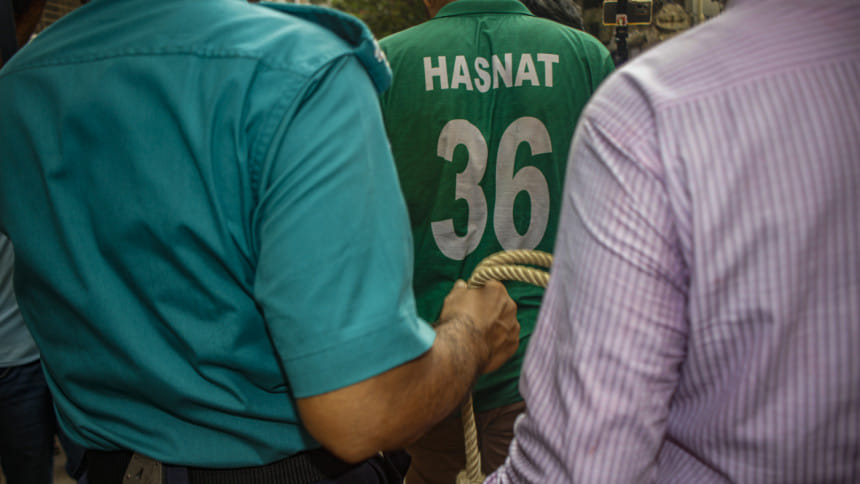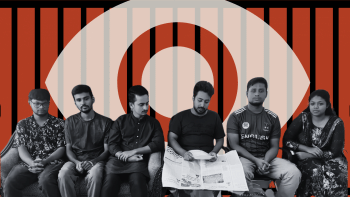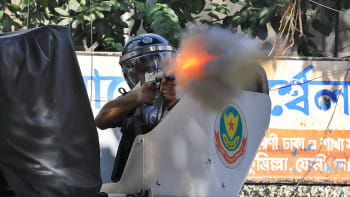Arrest of 17-year-old: Juvenile justice must prevail

Hasnatul Islam Faiyaz, an eleventh-grade student at Dhaka College, was put on a seven-day remand in a case filed with Jatrabari Police Station, accusing him of killing a police constable on July 19 amid the violent clashes that erupted throughout the country. He was made the 16th accused among 17 in the case file, which erroneously listed his age as 19 years old. But since then, Faiyaz's remand has been cancelled, and he has been sent to a Child Development Centre in Gazipur. This is despite the High Court saying the government can consider keeping Faiyaz in his parents' custody. However, the government on Monday admitted that taking a 17-year-old college student on remand, and tying him with ropes, was a mistake, and that it will take steps so that such mistakes are not repeated.
However, the court proceedings that preceded these remedial steps had shockingly disregarded the legal and constitutional obligations meant to protect a minor, who is clearly 17 years old, as evidenced by his birth registration and SSC certificates. He had been treated as an adult, resulting in a series of legal errors and violations of his rights. This mistreatment of a minor was not only a gross violation of human rights; it also demonstrated a disregard for the legal protections afforded to juveniles in Bangladesh.
The Children Act 2013 explicitly mandates that minors should be tried in juvenile courts, which are designed to consider their best interests and focus on rehabilitation rather than punishment. In Faiyaz's case, a petition had been filed for the transfer of the hearing to a juvenile court, but the lower court didn't respond to the plea and placed him on remand.
Furthermore, Faiyaz had been tied with a rope around his waist, just like other adult accused, when he was brought into the court. This conduct plainly violated the dignity, care, and respect that juveniles are entitled to get under the act, which prohibits such mistreatment. It also stipulates that juveniles should not be handcuffed or presented to court in such a disgraceful manner. There is no doubt about the fact that a minor, who is barely out of adolescence, being treated as an adult offender is a serious violation.
According to media reports, outside the courthouse on Saturday, Faiyaz's family members stated that he had been missing for four days and alleged, quoting Faiyaz, that he had been subjected to severe physical and mental torture during the days prior.
Despite some loopholes, Bangladesh has a moderate regime for birth registration, which is the cornerstone of the traditional age verification procedure in judicial proceedings. In cases where official documentation is unavailable or contested, courts frequently depend on the subjective standard of physical maturity, which is often unreliable but widely practiced. Even with adequate documentation of his age, Faiyaz's appearance—such as his lack of facial hair and overall childlike looks—should have been a strong indicator of his minority. In the past, courts have exercised discretion based on such visible signs of youthfulness.
While costly and time-consuming, forensic age assessment methods like dental analysis or bone ossification are more reliable and have been applied in past cases, such as the Oishi Rahman case (2013), where courts have ordered forensic assessments to resolve age disputes. The lower court's unwillingness to verify Faiyaz's age using such methods, despite these precedents, was a significant oversight. Moreover, ignoring the legal protections afforded to juveniles by failing to verify his age using reliable forensic methods or any other means represents a major weakness in the judicial process, as accurate age verification procedures are required to avoid such grave errors and ensure the lawful treatment of minors.
The question inevitably arises regarding the uniform manner in which the court should handle the determination of the minority status of any accused at the very first instance. The current system appears to rely substantially on the court's discretion, especially where the age is contested and before forensic assessments are directed. However, as Faiyaz's case shows, this procedure is not beyond the possibility of legal error. Therefore, a mechanism should be in place to order an initial age verification procedure before appearing in court, which involves reviewing birth certificates, academic records, and any other relevant documents. This should uphold a propositional burden on relevant stakeholders for securing justice for a certain juvenile group vulnerable to judicial proceedings. While writ petitions can protect against legal errors that result in violations of fundamental rights, there should also be direct avenues for appealing remand decisions in higher courts specifically designed to handle juvenile justice issues.
The Children Act offers children under the age of 18 particular safeguards. According to the act, a minor shall not be held in police custody or jail unless it is absolutely required, and a child arrested must appear before a Children's Court within 24 hours. The Constitution of Bangladesh, on the other hand, forbids torture and cruel, inhuman, or humiliating punishment, according to Article 35(5). The claims of extreme mental and physical suffering that Fayaz endured while in police custody constitute a clear violation of his constitutional rights.
Bangladesh is a party to the UN Convention on the Rights of the Child (UNCRC), where Article 37 states that detention or imprisonment of children can be used only as a measure of last resort and for the shortest amount of time that is appropriate. This convention also forbids torture and other cruel treatment.
In the country's current context when law enforcement is in overdrive, there may be attempts to disregard such principles and prohibitions, but it is absolutely essential that nothing of this sort is allowed to happen in the name of ensuring security or rule of law. The protection of juvenile rights should remain a non-negotiable aspect of maintaining the integrity of the legal system in Bangladesh. Ensuring that juvenile rights are upheld at all costs is not just a legal obligation but a moral imperative as well. The legal system must ensure that the age of the accused is accurately determined, and that their rights are fully served, regardless of the circumstances.
Md Kowshik Shahriar is a student of law at North South University.
Views expressed in this article are the author's own.
Follow The Daily Star Opinion on Facebook for the latest opinions, commentaries and analyses by experts and professionals. To contribute your article or letter to The Daily Star Opinion, see our guidelines for submission.

 For all latest news, follow The Daily Star's Google News channel.
For all latest news, follow The Daily Star's Google News channel. 









Comments